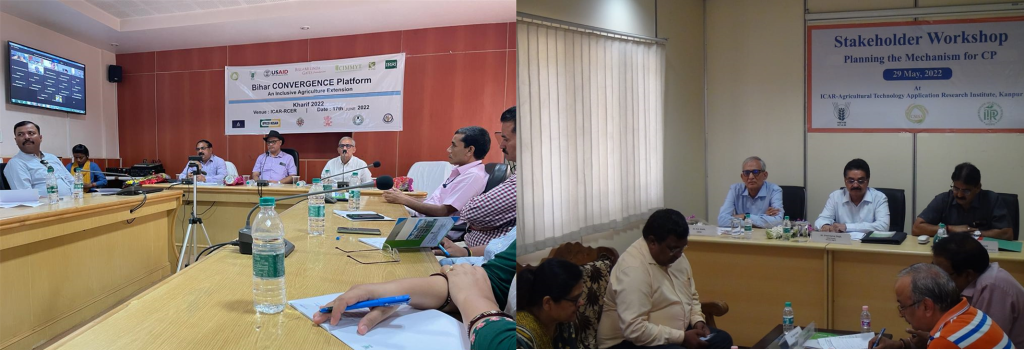Convergence Platform for blending research and extension initiatives in the EIGP
Agricultural Technology Adoption Research Institutes (ATARIs) from Kanpur and Patna organized state-level “Convergence Platforms” meetings on 29th May in Kanpur, Uttar Pradesh, and 17th June in Patna, Bihar. Convergence Platform (CP), an initiative encouraged by CSISA following the success in Bihar, is a collaborative platform with all stakeholders in agriculture research, food, and agri-system development to strengthen collaborative delivery.

The CS meeting in Uttar Pradesh was chaired by Dr. US Gautam, Director ATARI, Kanpur, with Mr. Vivek Kumar Singh, Director Agriculture, Department of Agriculture, as the Chief Guest.
Dr. Anjani Kumar, Director ATARI Patna, chaired the meeting in Bihar. The CPs in each state have been set up to bring out a consensus on technologies for scaling, understanding gaps in adoption, and setting priorities in research and extension. Both the meetings were attended by Department of Agriculture (DOA) officers, CP members from respective State Agricultural Universities (SAUs), private sector, state livelihood missions, and CSISA-KVK network members from UP and Bihar.
At the meeting, all participating institutions decided to organize a joint demonstration of technologies – for farmers – in select districts in each state. Some key considerations that emerged from the two meetings:
- There is still more adoption of old varieties in rice released in the 1980s and 1990s. Gaining the trust and confidence of farmers is crucial for varietal adoption. Risks associated with poor adoption of varieties can be reduced by picking the highest yielders from the new varieties and comparing them with the highest yielder from the old varieties. Farmers judge the yield performance as an indicator rather than the expectations from researchers. With shrinking profit margins, the yield penalty will not be acceptable to farmers.
- Long-duration rice varieties (LDRVs) are still popular, especially in South Bihar. Medium duration varieties in the upper maturity range of 140-145 days are popular in the eastern and central UP. In shallow low land ecologies, varieties with a maturity duration of more than 140 days are more acceptable to farmers in both states.
- North Bihar farmers and farmers in central UP prefer hybrids. With evidence, farmers can be convinced to adopt both hybrids and varieties. Medium duration varieties or hybrids allow scope for early establishment of wheat by 10-15 days resulting in higher wheat and overall cropping system yield.
- This season, CP members propose DSR cultivation after pre-sowing irrigation, also called Vattar DSR, or soil mulch-based DSR. Vattar DSR helps to de-risk as water-saving is only possible through Vattar DSR. Dry soil mulch in the upper soil surface saves water and helps reduce weed emergence for a few days.
- Rice Nursery Enterprise (RNE) based activity improved the confidence of women farmers in districts wherever JEEViKA worked together with KVKs. One of the reasons why it is being expanded further. It also helped create viable opportunities for both men and women farmers, to have informed choices with proven scientific recommendations
- In the Mahrajganj district of Uttar Pradesh, CSISA-KVK experiences in the last ten years with system yield maximization at farmers’ fields demonstrates that early rice transplanting followed by zero tillage of wheat could produce more than 12 tones/ha rice and wheat yields. This establishes that agronomic management is vital for improving system yields in the EIGP.
- There is much lower paddy yield in Bihar and EUP even with the same NPK (Nitrogen, Phosphorus and Potassium) rates as in Punjab, which is a definitive indicator of poor agronomic management in the EIGP.
- CP members agreed to finalize messages to be transmitted to farmers as the Kharif season progresses in eastern UP and Bihar.
